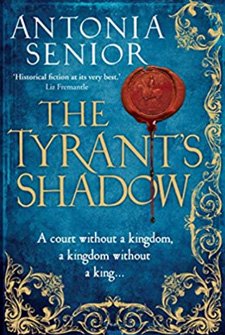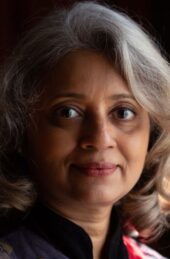Antonia Senior talks to Elizabeth Fremantle about her novel The Tyrant’s Shadow.
The Tyrant’s Shadow follows on from the events of your previous novel Treason’s Daughter, was it always your intention to write more than one book with these characters?
I had intended to write only one book. It was my then editor’s idea to write another, and if I had realised I would revisit some of the characters in Treason’s Daughter, I might not have bumped one of them off. But Tyrant’s Shadow can absolutely be read as a stand-alone, and that was always my intention.
I was very drawn to the character of Will in this novel. He was a smaller character in the first book, but he’s central to this one. He’s a quiet, passive sort of a chap – and he couldn’t hold up a story on his own, so the book also followed his sister. But I loved the idea of someone so disillusioned with the political process being so close to power. The English Civil Wars were one of those periods that forced people into hard-line positions – a bit like now. There’s something familiar to me in his stance – looking on with bemusement as people foam with passion over politics and utterly fail to recognise any validity in the other side’s position. Like Will, I find it all wearying, while understanding that it is necessary to be engaged.
What initially compelled you to write about this period of history?
A brilliant history teacher. I did the English Civil Wars for A-level – and her enthusiasm and knowledge were infectious. It’s a long time ago now, but I kept up my interest over the years. It has everything – drama, conflict, personal failures. A King who wasn’t good enough. A reluctant dictator. Religious fervour. The earliest feminists. Families torn apart.
I was thinking about writing the period for a while, but was floundering for a story. I was living in Fetter Lane, just off Fleet Street. Idly googling the street one day, I found the story of a merchant in the English Civil War who was hung in his own street for plotting to hand London back to the King. Treason’s Daughter was conjured from that nugget.
Why do you think it is that fiction writers have tended to cluster around the sixteenth century rather than the seventeenth, which seems to be to be every bit as tumultuous, and would you agree that we are seeing the beginnings of a shift towards the Stuarts from the Tudors?
It is a mystery to me why the Stuarts have been quiet – with some notable brilliant exceptions. Lindsey Davis, Katherine Clements and yourself spring to mind, as do Giles Kristian and Michael Arnold on the swords ‘n muskets sides. I also love JD Davis’ Restoration naval novels. Maria McCann wrote a superb book set in the period called As Meat Loves Salt – which deserves to be rapturously adored by historical fiction readers. They have all been a bit eclipsed by the Tudors.
I think that the Civil Wars are difficult because they are fiendishly complicated – so steering readers through the politics can be a problem. The religious aspect muddies things: puritanism seems so utterly barmy to modern eyes, that the parliamentarians become unsympathetic even when their cause is valid. In short, both sides are bloody annoying in their own way. Tudor stories are, perhaps, simpler. Bad fat king marries schemer/innocent and lops off her head.
I think the Stuarts’ time will come, though, – there are so many stories to tell! Henrietta Maria hiding in a ditch as a cannon ball whistles overhead. James I holding wild parties in a secret grotto under Banqueting House. Charles I is an incredibly flawed, interesting character – I’d love to see someone do a Wolf Hall on him.
As a reviewer of historical fiction you must have to read a great deal. Do you find it a distraction when writing your own work?
I have to read at least 5 books a month for my review column. I’m also a judge for this year’s HWA Gold Crown – and we’ve had more than 90 entries. My postman genuinely hates me.
I love historical fiction and I always have. As a child, I read all the Mary Renault Greek books, and all the Hornblower novels about 15 times each. I went sailing on tall ships in my 20s, just because of the books. I’m pretty sure that the only reason I had a third child is because I have got into the habit of re-reading the complete 21 book cycle of the Aubrey/Maturin novels on each maternity leave. I associate being fatly, miserably pregnant with being in the company of Jack and Stephen, my favourite characters in all the world. So it is genuinely a privilege to review historical fiction and I have learned to separate my reading life from my writing.
My one gripe is that I never get time to read anything other than historical fiction – and I sometimes get very upset about all the brilliant books passing me by. I want to read Naomi Alderman’s The Power, and Lincoln in the Bardo. I’ve bought them anyway so they can sit unread next to my bed.
Do you have any particular favourites when it comes to reading history?
As I mentioned above, I love Mary Renault, CS Forester and Patrick O’Brien above all others. They are my constant friends.
Among writers that are alive, I am a fan of Bernard Cornwell for his indefatigability. On the day that the next Mantel comes out, I will draw the curtains, muffle the phone and send the kids to their Grandparents. There is an incredible depth of talent in this genre – and I’m lucky enough to be able to spotlight a few talented authors each month.
As an author and journalist who is also the mother of young children, do you have anything to say about the ‘pram in the hall’ being the enemy of good art from a female perspective?
Obviously, time pressures are difficult. I spend much time I do not have looking at writer retreats and residencies that I will never be able to go on. Unless someone knows of a free retreat with a crèche?
I also have little time to do any of the relentless self-publicising that authors need to do nowadays. And that is a problem.
But I tend to think about this issue from the opposite perspective. Writing has kept me sane while I’ve had young children. I’m not very good with the unrelenting boredom and drudgery of looking after irrational little humans. On the outside I’m singing wheels on the bus for the 500th arseing time. On the inside, I’m wondering exactly how it feels to charge with the Horse at Naseby; or having imaginary conversations with Will about Oliver Cromwell’s constitutional quandaries.
Your novels are meticulously researched. Would you share some of the secrets of your writing and research?
I am most interested in the mind-set of the periods I write, rather than the detail of day-to-day life. I will care about what shoes people wore when I have to, but….
So I read a lot of contemporary poetry, and philosophy, and religious tracts. Anything to help me try to think differently. For example, in the 1650s, women begin to articulate the idea that they are political agents in their own right. But their agency is all centred around their relationship with God first, and the State second. I need to think my way into that constant dialogue with a living God – even though I am a strident atheist and feminist.
In general, though there is no secret other than read a lot and write often. Try not to give in to despair.
And if you are working from home and you decide you absolutely must have a nice nap, sleep on the floor. You wake up sooner, and rise quicker.






